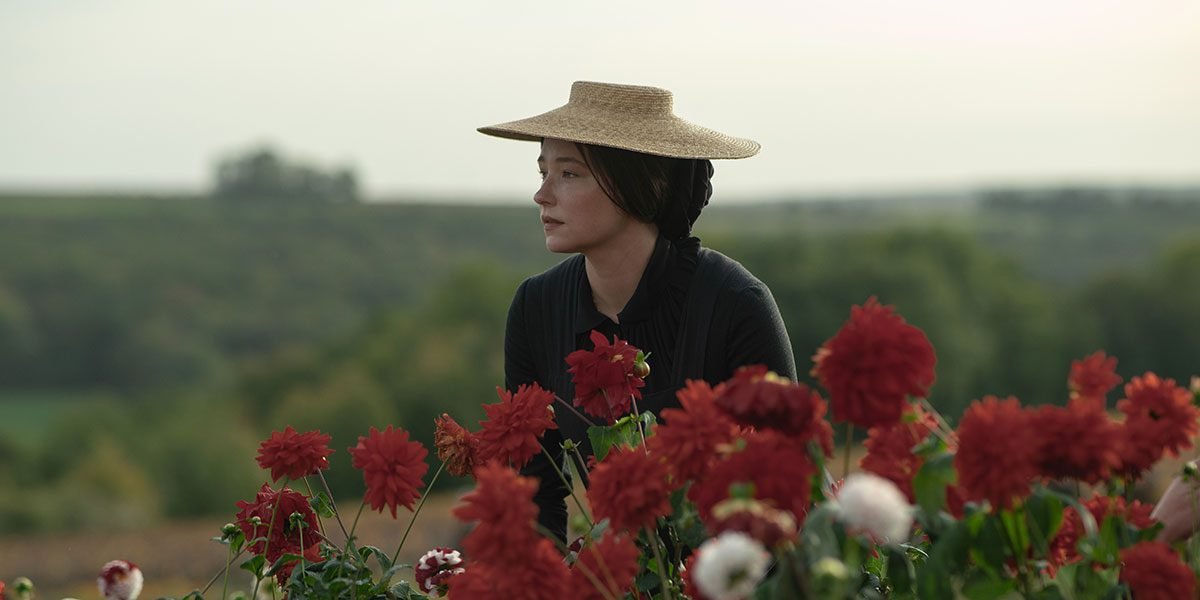TIFF23: “Widow Clicquot” - Film Review
This review was originally posted on Film Obsessive.
Many people have used champagne to celebrate a special event at least once in their lives. The beverage can be found at parties, weddings, graduations, retirements, and most of life’s milestone moments. What they don’t know, however, is that they have a widow who lived in the early 19th century in France to thank for it. Widow Clicquot is the story of Barbe-Nicole Clicquot (Haley Bennett), the Grande Dame of Champagne, who, at twenty-seven years old, inherited a vineyard after the passing of her husband François (Tom Sturridge). Barbe-Nicole saved the vineyard and revolutionized the champagne-making process. Her production methods are still in use today.
Widow Clicquot, a selection of the 2023 Toronto International Film Festival, takes place only in the house and the vineyard, and the barrier between them seems to be non-existent at times. This speaks to the way Barbe-Nicole’s life is transformed from being the woman of the house to the owner of the company. In the 1810s, that’s a type of freedom not many women are afforded, so the hectares can feel sprawling in the context of her fear of running the business on her own. They’re so large and all within her purview. Yet the fact that the film only exists within this one location is often stifling, because this bright, brilliant woman isn’t able to see the rest of the world. When the winery is failing, the audience can see the vines through the windows. This is a stark, ever-present reminder of what’s at stake. The vines were François’ passion, and he remains alive through them. Barbe-Nicole is haunted by them, stalked throughout her house, unable to escape from the visible reminder of her deceased husband.
Courtesy of TIFF
Because of the film’s singular location, director Thomas Napper had to be creative in terms of staging. How does one keep things fresh when there’s a limited number of rooms to exist in? Especially when Widow Clicquot splits its time almost evenly between present-day scenes and the lead-up to the death of François. Erin Dignam’s script is concise and tightly-paced, so it never feels like the audience is missing information from either timeline. The script lingers at times with Barbe-Nicole in her grief, or in the love that blossomed between François and Barbe-Nicole, but never stays too long in any one scene. Dignam’s confident control of this story is impressive. Even though the film covers ten years, Widow Clicquot is economic in its storytelling and proves that Dignam has an impressive grasp of the life of Barbe-Nicole. He knows what’s essential to introducing this woman to the world.
Based on Dignam’s fluid script, Napper was forced to figure out how to make the present day and flashbacks feel seamless. All of these events, the good and the bad, are happening in the same rooms, years apart. Napper thoughtfully uses already-existing frames like windows and doors to transport the audience and Barbe-Nicole through time. The setting is so intrinsically tied to François (this is his family’s vineyard after all) that the audience has to feel like he’s just around the corner, even if he is deceased. It’s a testament to Napper’s vision that the setting becomes a character of its own, its journey equally as important as those of the others.
Courtesy of TIFF
While Barbe-Nicole and the rest of the cast are French in actuality, Widow Clicquot portrays all of them as having a British accent. Widow Clicquot is not the first (or likely the last) that would prefer to have its actors try to have a French accent. In the grand scheme of things, though, it’s not a big deal, nor does it remotely impact the story on display. In fact, the British accents combined with the close-up shots of lovers’ hands briefly touching, the stunning natural landscape, and the smoldering, lingering looks in stuffy rooms make Widow Clicquot feel like it belongs in the same conversation as the 2001 Pride and Prejudice. It’s therefore not surprising to learn that Joe Wright, director of Atonement and leading director in the genre of repressed British longing, acts as an executive producer for Widow Clicquot. While director Napper’s film has its own visual language, Widow Clicquot would not be out of place in a double bill with any of Wright’s films (except The Woman in the Window).
Veuve Clicquot, the famous French champagne house, translates to “Widow Clicquot.” It would have been impossible for Barbe-Nicole to know just how much she would change the industry and her story isn’t well-known to those who aren’t in the wine/champagne world. Barbe-Nicole created something that has long since outlived her and will likely outlive many of us. In a sense, Veuve Clicquot is the film’s titular widow because they lost Barbe-Nicole to old age in 1866. This company, built on her hard work, was forced to find its way again without her. Widow Clicquot is a hidden secret of TIFF 2023, a well-done take on a biopic, and proof, yet again, that Bennett is an utter powerhouse.
Follow me on BlueSky, Instagram, Letterboxd, & YouTube. Check out Movies with My Dad, a new podcast recorded on the car ride home from the movies.


